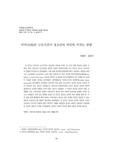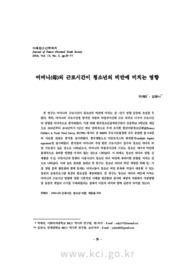

-
 * 본 문서는 배포용으로 복사 및 편집이 불가합니다.
* 본 문서는 배포용으로 복사 및 편집이 불가합니다.
미리보기
서지정보
· 발행기관 : 미래를 여는 청소년학회
· 수록지 정보 : 미래청소년학회지 / 13권 / 3호
· 저자명 : 박애리, 김유나
목차
Ⅰ. 서 론
Ⅱ. 연구방법
Ⅲ. 연구 결과
Ⅳ. 논의 및 결론
참고문헌초록
본 연구는 어머니의 근로시간이 청소년의 비만에 미치는 장․단기 영향 검증에 초점을 두
었다. 특히, 어머니의 근로시간을 양적인 차원과 비정규시간대 근로 여부로 나누어 근로시간
의 영향을 다각적으로 분석하였다. 이를 위해 한국청소년정책연구원이 초등학교 4학년을 대상
으로 2010년부터 2014년까지 5년간 매년 반복적으로 추적 조사한 한국아동청소년패널(Korean
Children & Youth Panel Survey, KCYPS) 데이터 중 BMI와 부모근로활동에 모두 응답한 총 816명
의 자료를 토대로 분석을 실시하였다. 분석방법으로 다중로지스틱 회귀분석(multiple logistic
regression)을 실시하였다. 분석결과 어머니의 주당 평균 근로시간이 길수록 청소년 자녀의 비
만 가능성이 높은 것으로 나타났으나, 어머니의 비정규시간대 근로는 청소년 자녀의 비만에
통계적으로 유의한 영향을 미치지 않는 것으로 나타났다. 이 외에도 청소년 자녀의 성별, 신
체활동 시간, 수면시간과 컴퓨터 이용시간이 청소년 자녀 비만에 유의미한 영향을 미치는 것
으로 나타났다. 이와 같은 결과를 토대로 본 연구는 청소년 자녀의 비만 예방을 위해 일․가
정 양립 정책 활성화와 함께 일하는 어머니들이 청소년 비만 문제에 적절이 대응할 수 있는
정보과 교육프로그램 제공의 필요성을 제안하였다. 본 연구는 청소년 자녀의 비만에 미치는
어머니의 근로시간 영향에 대한 기본적인 이해를 제공함과 동시에 예방적 차원에서 지원방향
및 실천적 개입의 근거를 구축하였다는 점에서 이론적 의미와 함께 실천적 의미를 갖는다.영어초록
The purpose of the study is to investigate the long term and short term effects of maternal working
hours on children's obesity. This study utilized data from four waves(wave 1 in 2010 through wave 3 in
2012 and wave 5 in 2014) of the Korean Children & Youth Panel Survey(KCYPS). Descriptive statistics
were used to describe the basic features of children's body mass index and maternal work schedules. Also,
multivariate logistic regression analyses were conducted to examine the effects of maternal work schedules
on children's obesity. This study has the following results: (1) There is a significant long-term relationship
between maternal working hours and children's obesity. (2) There is no statistically significant effects of
maternal irregular working hours on children’s obesity. (3) Time spent in physical activity, hours of sleep
during weekend, and hours of using computer during weekend are all significantly related to children's
obesity later. The results indicates that children whose mothers work will be an important target for
intervention to prevent children’s obesity. This study suggests the importance of implementing work and
family balance policies as well as providing parents’ education program and information to prevent
children’s obesity.참고자료
· 없음태그
-
자료후기
Ai 리뷰지식판매자가 등록한 자료는 과제에 직접 활용할 수 있는 유용한 내용이 많아, 큰 도움이 되었습니다. 앞으로도 계속 좋은 자료 부탁드립니다! 감사합니다. -
자주묻는질문의 답변을 확인해 주세요

꼭 알아주세요
-
본 학술논문은 (주)학지사와 각 학회간에 저작권계약이 체결된 것으로 AgentSoft가 제공 하고 있습니다.
본 저작물을 불법적으로 이용시는 법적인 제재가 가해질 수 있습니다. -
해피캠퍼스는 구매자와 판매자 모두가 만족하는 서비스가 되도록 노력하고 있으며, 아래의 4가지 자료환불 조건을 꼭 확인해주시기 바랍니다.
파일오류 중복자료 저작권 없음 설명과 실제 내용 불일치 파일의 다운로드가 제대로 되지 않거나 파일형식에 맞는 프로그램으로 정상 작동하지 않는 경우 다른 자료와 70% 이상 내용이 일치하는 경우 (중복임을 확인할 수 있는 근거 필요함) 인터넷의 다른 사이트, 연구기관, 학교, 서적 등의 자료를 도용한 경우 자료의 설명과 실제 자료의 내용이 일치하지 않는 경우
“미래청소년학회지”의 다른 논문도 확인해 보세요!
-
직무만족도와 이직의도의 관계에서 청소년지도자 효능감의 조절효과 18 페이지
본 연구의 목적은 인구사회학적 특성에 따른 직무만족도, 청소년지도자 효능감, 이직의도의 차이를 살펴보고, 청소년지도자의 직무만족도가 이직의도에 영향을 미치는지 분석하고, 이 두 변인의 관계에서 청소년지도자 효능감이 조절변인의 역할을 하는지 조사하는 것이다. 본 연구 의 대상은 청소년시설에 근무하는 233명의 청소년지도자였다. 연구결과는 다음과 같다. .. -
대학생의 부적응적 대처전략이 데이트 관계 집착과 갈등 및 관계만족도에 미치는 영향 23 페이지
본 연구는 대학생의 부적응적 대처전략이 데이트 관계 집착과 갈등 및 관계만족도에 미치 는 영향이 어떠한지를 성별에 따라 살펴보았다. 본 연구의 대상은 충청북도 청주시에 소재한 2개의 4년제 대학교에 다니고 있는 대학생 528명이었고, 자료 분석은 질문지법으로 수집하여 경로모형 분석기법을 사용하였다. 본 연구의 결과 첫째, 남자 대학생의 대처전략과 여자.. -
미래 청소년 환경변화에 대한 전망적 연구 30 페이지
이 연구에서는 2040년까지의 미래 청소년 환경 변화를 전망해보고 청소년 정책의 방향 및 과제를 제시해보고자 하였다. 이를 위해, 첫째, 문헌연구와 전문가조사를 통해 미래 청소년 환 경 트렌드에 대한 전망을 제시하였고, 둘째, 전문가조사를 통해 청소년 환경 트렌드 간의 관 계에 대한 전망과 이를 바탕으로 한 단일시나리오를 제시하였다. 연구결과, 양극화..
찾으시던 자료가 아닌가요?
지금 보는 자료와 연관되어 있어요!
문서 초안을 생성해주는 EasyAI



